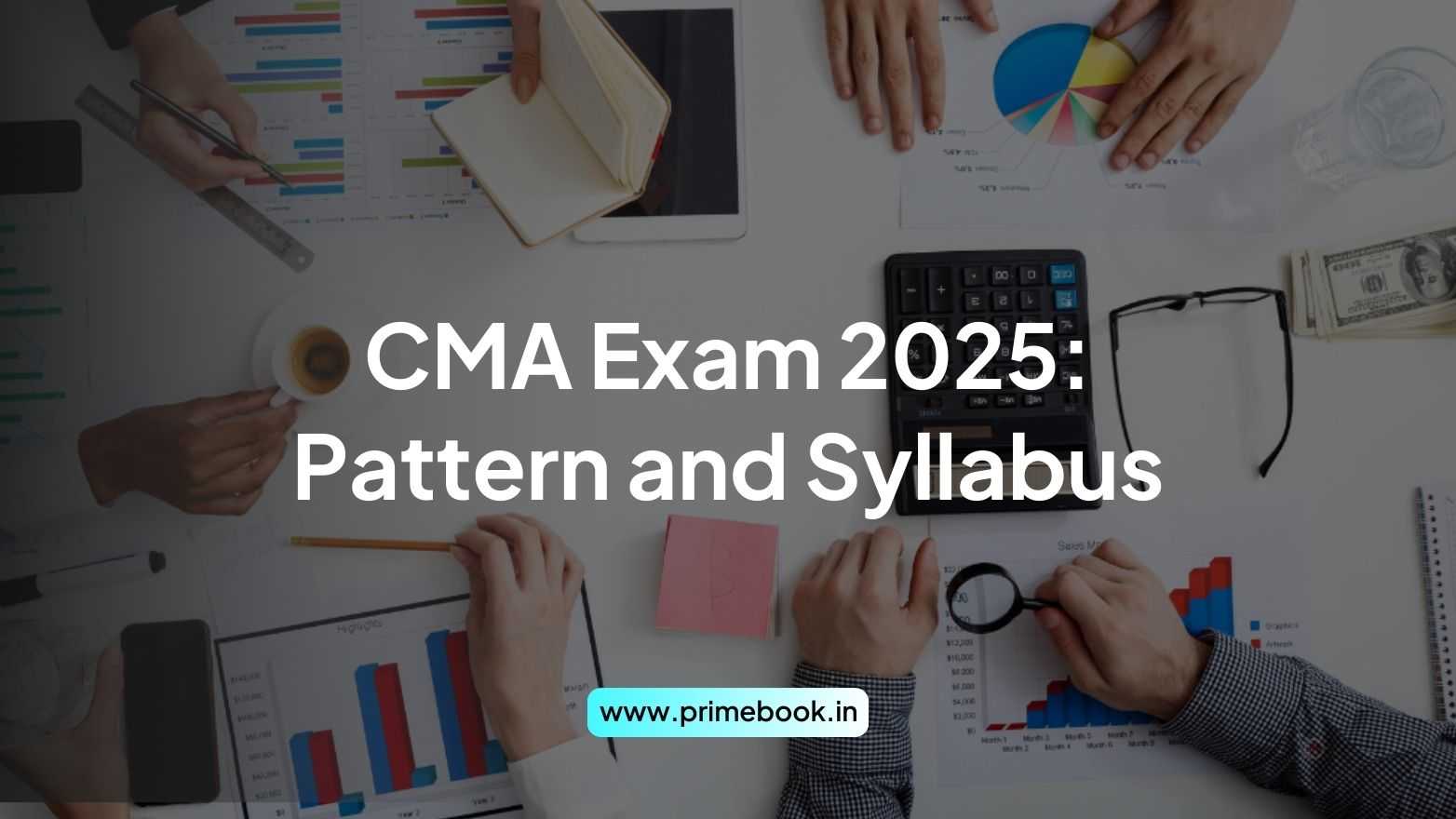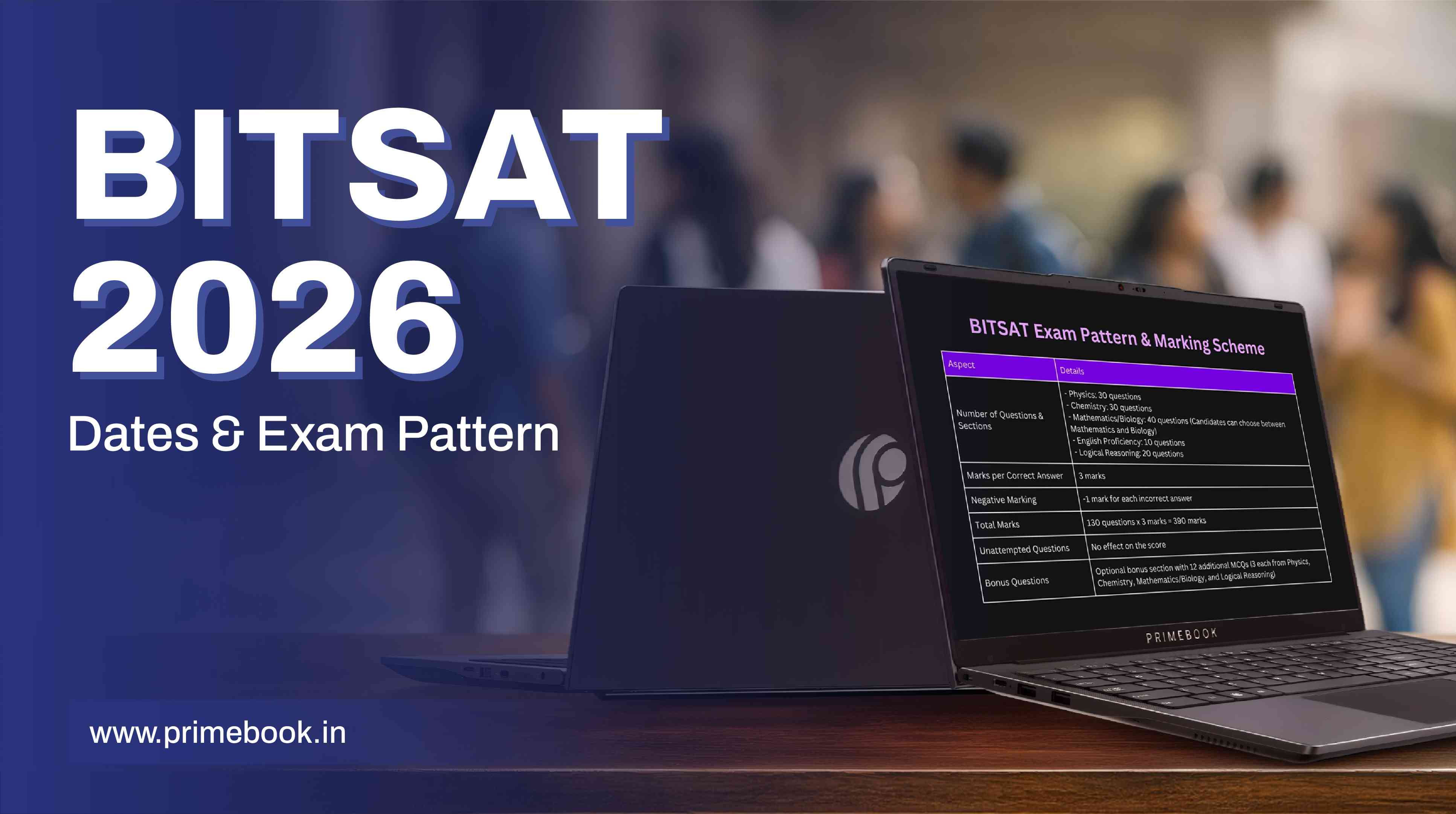Blogs / Student's Corner / CMA Exam 2025: Pattern and Syllabus
Blogs / Student's Corner / CMA Exam 2025: Pattern and Syllabus

Primebook Team
16 May 2025

CMA Exam 2025: Pattern and Syllabus
If you are aiming to become a certified Cost and Management Accountant in India, the CMA 2025 exam is the only gateway. With applications for the June 2025 session now closed, the focus shifts entirely to preparation, and how well you understand the structure and subjects can make or break your attempt. To help you prepare with clarity, this blog gives a detailed glimpse of the CMA exam pattern and the complete syllabus for each stage and subject. Scroll and read because the effort you put in now will shape how confidently you walk into the exam hall!
Overview of CMA Exam 2025
The Cost and Management Accounting or CMA exam is one of the most recognized professional qualifying tests in India for careers in cost accounting, audit, and financial management. Often confused with the international Certified Management Accountant credential, the Indian CMA is a separate certification conducted and regulated solely by the Institute of Cost Accountants of India (ICMAI). The exam is held twice a year, typically in June and December, and is structured into three levels, Foundation, Intermediate, and Final. It is conducted in over 100 cities across India, with centers allotted based on candidate location preferences at the time of registration.
If you missed applying for the June 2025 session, you can wait for the December cycle, which will be announced later this year. Keep an eye on the official ICMAI website for the notification release and registration timeline.
CMA Exam Pattern for 2025
Following the previous years’ pattern, the CMA 2025 exam for the June session will be conducted in offline (pen-and-paper) mode and will follow a stage-wise format as already mentioned above. Each level has a fixed number of papers, and you must clear one level to become eligible for the next.
Here’s how the structure looks across levels.
CMA 2025 Foundation Level Exam Pattern
-
Number of Papers: 4
-
Type of Questions: Objective (Multiple Choice)
-
Exam Duration: 2 hours per paper
-
Total Marks Per Paper: 100
-
Passing Criteria: Minimum 40% in each paper and 50% aggregate overall
CMA 2025 Intermediate Level Exam Pattern
-
Number of Papers: 8 (divided into Group I and Group II, 4 each)
-
Group Choice: You may appear for one or both groups in a session
-
Type of Questions: Mixed (Objective + Descriptive)
-
Exam Duration: 3 hours per paper
-
Total Marks Per Paper: 100
-
Passing Criteria: Minimum 40% in each paper and 50% aggregate per group
CMA 2025 Final Level Exam Pattern
-
Number of Papers: 8 (Group III and Group IV, 4 each)
-
Group Choice: Same as the intermediate level
-
Type of Questions: Mixed (Objective + Descriptive)
-
Exam Duration: 3 hours per paper
-
Total Marks Per Paper: 100
-
Passing Criteria: Same as Intermediate — 40% per paper and 50% per group
Each level is evaluated independently, and there is no negative marking across any of the three levels. Papers are conducted on fixed national dates, as per ICMAI's official exam schedule.
Also Read: IBPS PO Exam 2025
Syllabus for CMA Exam 2025 (Stage & Subject Wise)
The syllabus for CMA 2025 is structured level-wise, with each stage covering specific subjects that test both your theoretical understanding and practical application. Here’s a complete breakdown of the syllabus to take note of. Remember, this is what acts as the base of the CMA exam, or any other exams, for that matter!
Syllabus for CMA Exam Foundation Subjects
-
Fundamentals of Business Laws and Business Communication
Covers the Indian Contract Act, Sale of Goods Act, and Negotiable Instruments Act, along with basic principles of business correspondence, official drafting, and communication ethics.
-
Fundamentals of Financial and Cost Accounting
Introduces basic accounting principles, preparation of final accounts, cost classification, and reconciliation of cost and financial accounts.
-
Fundamentals of Business Mathematics and Statistics
Includes ratio and proportion, simple and compound interest, linear equations, and statistical tools like mean, median, mode, standard deviation, and correlation.
-
Fundamentals of Business Economics and Management
Focuses on demand and supply, market structures, national income concepts, and fundamental principles of management such as planning, organising, and control.
Syllabus for CMA Exam Intermediate Subjects
Group I
-
Business Laws and Ethics
Consists of the Companies Act, Law of Contracts, LLP Act, and business ethics in professional conduct.
-
Financial Accounting
Focuses on accounting standards, preparation of financial statements for various types of organisations, and special transactions like consignment and joint ventures.
-
Direct and Indirect Taxation
Dives deep into the structure and computation under the Income Tax Act and the GST regime, with emphasis on returns, deductions, and input tax credit.
-
Cost Accounting
Includes material and labour costing, overhead allocation, contract costing, and techniques like marginal and standard costing.
Group II
-
Operations Management and Strategic Management
Covers production planning, inventory control, quality management systems, and strategic analysis tools, including SWOT and BCG Matrix.
-
Corporate Accounting and Auditing
Deals with accounting for amalgamations, share capital, debentures, and auditing principles, vouching, verification, and audit reports.
-
Financial Management and Business Data Analytics
Introduces capital budgeting, cost of capital, working capital management, and basics of data visualisation, dashboards, and trend analysis.
-
Management Accounting
Delves into budgetary control, responsibility accounting, transfer pricing, and divisional performance evaluation.
Syllabus for CMA Exam Final Subjects
Group III
-
Corporate and Economic Laws
Entails company law provisions, SEBI guidelines, FEMA, labour laws, and aspects of economic offences.
-
Strategic Financial Management
Encompasses investment decisions, portfolio theory, derivatives, foreign exchange exposure, and mergers and acquisitions.
-
Direct Tax Laws and International Taxation
Engages in advanced income tax planning, tax treaties, transfer pricing, and BEPS (Base Erosion and Profit Shifting).
-
Strategic Cost Management
Centers around life-cycle costing, target costing, value chain analysis, and strategic decision-making techniques.
Group IV
-
Cost and Management Audit
Emphasises on statutory cost audit procedures, performance appraisal, internal control evaluation, and management audit reports.
-
Corporate Financial Reporting
Looks at consolidated financial statements, valuation of goodwill, integrated reporting, and financial statement analysis.
-
Indirect Tax Laws and Practice
Offers an in-depth understanding of GST law, customs procedures, anti-profiteering, and tax administration.
-
Elective Paper (One of the following)
-
Strategic Performance Management and Business Valuation
-
Risk Management in Banking and Insurance
-
Entrepreneurship and Start-Up
-
Advanced Indirect Tax Laws
To wrap up, preparing for the CMA exam 2025 isn’t just about knowing the exam pattern or covering the syllabus. It’s also about approaching it with organization. Whether you're starting at the foundation, navigating the depth of intermediate, or gearing up for the final stage, the key is consistent revision, targeted practice, and clarity on concepts that carry weight. Use this time to pace your study plan, strengthen your grip on key subjects, and avoid last-minute overload. The format is predictable; what you do with it from here is what will count!
For more information on other national or state-level examinations, look out for Primebook’s Student Corner.


 Related Blog
Related Blog









